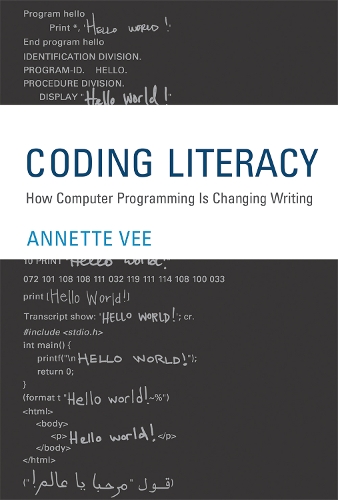
Coding Literacy: How Computer Programming Is Changing Writing
(Hardback)
Publishing Details
Coding Literacy: How Computer Programming Is Changing Writing
By (Author) Annette Vee
MIT Press Ltd
MIT Press
28th July 2017
United States
Classifications
Professional and Scholarly
Non Fiction
Mobile and handheld device programming / Apps programming
Communication studies
005.1
Physical Properties
Hardback
376
Width 152mm, Height 229mm, Spine 19mm
Description
How the theoretical tools of literacy help us understand programming in its historical, social and conceptual contexts.The message from educators, the tech community, and even politicians is clear- everyone should learn to code. To emphasize the universality and importance of computer programming, promoters of coding for everyone often invoke the concept of "literacy," drawing parallels between reading and writing code and reading and writing text. In this book, Annette Vee examines the coding-as-literacy analogy and argues that it can be an apt rhetorical frame. The theoretical tools of literacy help us understand programming beyond a technical level, and in its historical, social, and conceptual contexts. Viewing programming from the perspective of literacy and literacy from the perspective of programming, she argues, shifts our understandings of both. Computer programming becomes part of an array of communication skills important in everyday life, and literacy, augmented by programming, becomes more capacious. Vee examines the ways that programming is linked with literacy in coding literacy campaigns, considering the ideologies that accompany this coupling, and she looks at how both writing and programming encode and distribute information. She explores historical parallels between writing and programming, using the evolution of mass textual literacy to shed light on the trajectory of code from military and government infrastructure to large-scale businesses to personal use. Writing and coding were institutionalized, domesticated, and then established as a basis for literacy. Just as societies demonstrated a "literate mentality" regardless of the literate status of individuals, Vee argues, a "computational mentality" is now emerging even though coding is still a specialized skill.
Author Bio
Annette Vee is Assistant Professor in the Department of English at the University of Pittsburgh.
